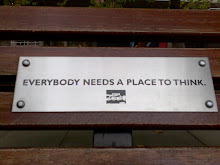
Shall we take a few moments and think.... what image comes into your mind when you think of the word 'disability'? What do you see when you think of that word?
Someone who is blind? Deaf maybe. On a wheelchair? (That often comes up doesn't it?) With an illness? Possibly. Someone who probably needs quite a lot help or can't do basic things for him/herself?
Years ago, a lady said this to me, 'You are a TAP.'
'What? What does that mean?' I asked.
'Temporarily Abled Person.'
That was something that started me thinking about how some of us tended to perceive ourselves and people with 'disabilities'. It's something that we don't usually talk about, if at all, because it can make people feel uncomfortable. Also, I guess if we don't see it, we just don't really think about it.
One of the best, most important things I've picked up in my course is a refreshing, logical and ethical way of perceiving what 'disability' entails. It started with the World Health Organisation (WHO) who established that our old way of looking at 'disability' was way too simplistic at best and completely flawed at worst. We were missing the main idea of what it means for that person who is faced with an impairment - however temporary or permanent it may be. Previously, 'disability' was all about the person with the problem. It's his/her problem - deal with it. You are deaf because you have deafness. You have deafness because you are deaf. This is not only disempowering but it also sets up a consciousness that creates a false dichotomy between deaf and non-deaf; disabled and abled; non-normal and normal; you and us. But something's missing in this equation. What role does society play? Surely, I am 'disabled' as far as society 'disables' me as well?
I may be say, on a wheelchair. But if no structural provisions are available around me to allow me to be independent (e.g. buses that accommodate me, MRT with lifts, buildings with ramps), now surely that disables me? Taking another example of a person with deafness. The impairment is that this person can't hear certain sounds at a certain range of frequency. Perhaps s/he was born with a cochlear dysfunction. (FYI, it's very rare for a person to be completely deaf. People with deafness can hear but usually at a restricted range of frequencies and need sounds to be amplified.) But, according to the WHO (and to common ethical sense really), this is only a partial definition of his/her 'disability'. The other half of the equation - i.e. societal barriers - is equally important, if not more so. In other words, if he/she is denied access to a hearing aid or cochlear implant, denied admission to mainstream schooling or equal opportunities at work, then it is not that this person is disabled, but this person has been disabled. It is probably a reflection of social and cultural progress when people within the society are able to see beyond a person's impairment as 'his/her problem'; but to be attuned that 'disability' has many dimensions to it - of which you and I are a part of.

No comments:
Post a Comment